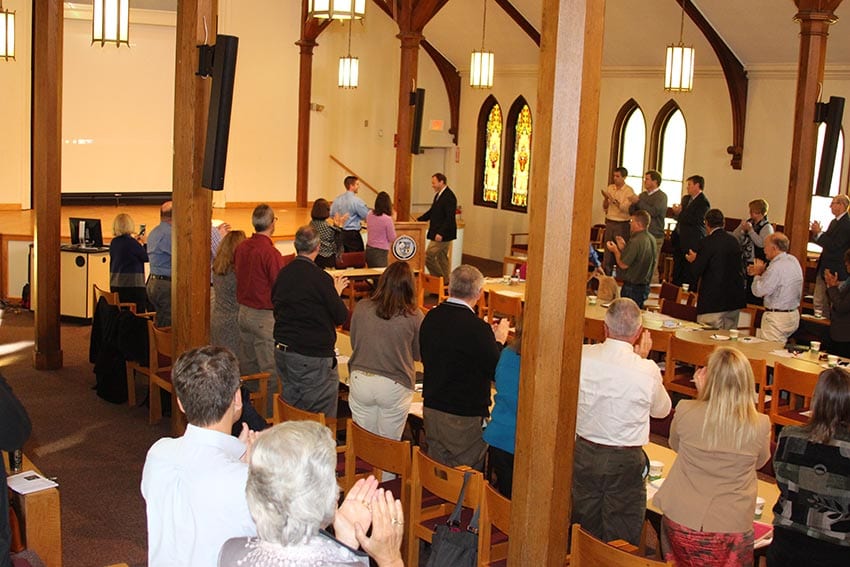October 24, 2015
centralmaine.com
By Raegan Larochelle
Only one affordable senior housing property is under construction in the entire state of Maine — the 47-unit Hodgkins School project in Augusta.
On Nov. 3, voters have an opportunity to improve the lives of Maine seniors, now and in the future. Statewide ballot Question 2, the senior affordable housing bond, provides for $15 million to construct new senior affordable housing units and finance essential repairs for the homes of low-income seniors.
Not only is Maine the oldest state in the nation, it also has the eighth oldest housing stock. As a result, thousands of Maine seniors do not have access to safe and affordable housing. Passage of Question 2 would make a significant difference in their lives. It also would create jobs for hundreds of Maine workers — contractors and trade professionals, architects and engineers, construction materials suppliers.
As the board chairwoman of the Augusta Housing Authority, I regularly hear from area seniors who struggle to make ends meet, who have spent a lifetime working hard and now find they cannot afford decent apartments or properly maintain their homes.
This year Housing Initiatives of New England completed the renovation of the former Cony High School, turning the historic building into 48 affordable senior apartments. With so many seniors desperately seeking affordable housing, it is no surprise that the units at the renamed Cony Flatiron Senior Residence were completely rented within four months and already has a growing waiting list.
Despite that success, recent market studies for the Augusta area demonstrate an exponential increase in the need for new senior housing units beyond those provided at Cony.
Augusta is by no means unique. A recent study by the economic consulting firm ABT Associates determined that 9,000 Maine senior households pay more than they can afford in rent, and that does not even take into account older homeowners who can no longer afford to maintain their homes. ABT concluded that without action, the number of senior households without access to affordable housing in Maine will increase to 15,000 by 2022.
Its findings are backed up by the experience of those who manage rental properties. The Maine Real Estate Managers Association recently surveyed its members, who include many providers of senior housing, and those organizations reported that 9,000 senior households are on waiting lists for their affordable apartments.
There is a clear need for more affordable senior housing and the many benefits it provides. Unfortunately, limited resources are available to build such housing. In the entire state, in fact, only one affordable senior housing property is under construction — the 47-unit Hodgkins School project being developed by the Augusta Housing Authority.
The Housing Authority is pleased to be a part of this development, as it will allow us to reduce our enormous waiting list, but when compared with the statewide need, it is obvious that Maine needs more resources.
Fortunately, the Legislature took bipartisan action this year in approving the $15 million senior affordable housing bond. The effort will provide funding to build 225 units of senior affordable housing and to repair the homes of 100 low-income seniors. Now it is up to voters to approve the bond by voting yes on Question 2.
A diverse group worked to achieve this bond, including the Maine Affordable Housing Coalition, the Maine Coalition on Aging, AARP-Maine, Associated General Contractors of Maine, Associated Builders & Contractors of Maine, and the Maine State Chamber.
A bipartisan super-majority of legislators supported this initiative, including co-sponsors House Speaker Mark Eves, D-North Berwick, Sen. David Burns, R-Whiting, Sen. Roger Katz, R-Augusta, Rep. Robert Nutting, R-Oakland, and Rep. Matthew Pouliot, R-Augusta.
The benefits of this effort will spread throughout the state and have a positive impact on the Maine economy. The bond requires that at least four projects be built in more rural counties that have fewer than 100,000 people.
The typical project will require 150-200 Maine workers from a range of construction, design, engineering and other professional trades. Building materials, predominantly from Maine suppliers, are expected to total more than $15 million. This work is essential for Maine’s construction industry, which still has not rebounded to pre-recession levels.
The new housing projects will be located conveniently near health care and essential services, and will pay local property taxes, which will strengthen communities both socially and financially. These homes also will exceed state energy efficiency standards, reducing Maine’s reliance on fossil fuels and lowering energy costs.
I urge Mainers to vote yes on Question 2, the senior affordable housing bond. Let’s ensure that our deserving seniors have a safe, affordable place to live, while simultaneously strengthening our communities and putting Maine people to work.
Raegan LaRochelle is the board chairwoman of the Augusta Housing Authority, a member of the Augusta Board of Trade and the Kennebec Valley YMCA board of directors, and is an economic development consultant with Eaton Peabody Consulting Group.


